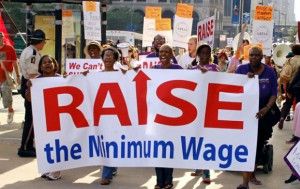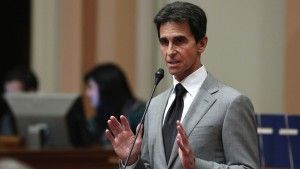State senate committee approves minimum wage hike
 California’s minimum wage workers will receive a 62.5 percent raise over three years if Senate Bill 3 is approved by the Legislature and signed by Gov. Jerry Brown. The Senate Labor and Industrial Relations Committee recently passed the bill on a 4-1 party line vote.
California’s minimum wage workers will receive a 62.5 percent raise over three years if Senate Bill 3 is approved by the Legislature and signed by Gov. Jerry Brown. The Senate Labor and Industrial Relations Committee recently passed the bill on a 4-1 party line vote.
It was only a year and a half ago that Assembly Bill 10 was signed into law. It raised California’s minimum wage from $8 an hour to $9 in July 2014 with another increase to $10 scheduled to take effect in January 2016.
SB3 would supersede that bill, increasing the minimum wage from the current $9 to $11 in January 2016 with another $2 bump to $13 in July 2017. Thereafter the minimum wage would increase with inflation.
Leno lays out argument for higher minimum wage
The bill’s author, Sen. Mark Leno, D-San Francisco, and its supporters spent more than an hour telling the committee that the wage hike is needed to lift California’s minimum wage workers out of poverty. They assured that doing so would not hurt businesses and would benefit California’s economy and the state budget.
“Wages are growing at the very slowest rate relative to corporate profits in the history of our country,” said Leno. “The median wage has been stagnant over the last 30 years. Sixty-five percent of workers are working paycheck to paycheck. Millions of Californians impacted by our minimum wage are living in poverty, and will continue to live in poverty even when we get to our incremental success under AB10 to $10 an hour next year.
“And they all by definition qualify for public assistance. That means that the taxpayer is subsidizing the private employer’s responsibility for his or her workers’ basic human needs: housing, food and medical care.”
A $13 minimum wage equates to about $26,000 per year, he said, which is above the federal poverty level of $24,250 for a family of four.
Leno argued that businesses will benefit from increased consumer spending. “When workers have more dollars in their pockets to spend on their daily needs, there’s an increase in demand for goods and services,” he said. “That’s when employers have to hire more employees to meet that demand. And that’s what economists call a virtuous upwards cycle.
“Currently, though, we’re in a stagnation, if not a vicious cycle downward, where we’ve put such constraints on the middle class that it’s shrinking and shrinking, putting more people into poverty.”
Higher wages will also benefit businesses by reducing turnover, attracting higher-skilled workers and increasing employee satisfaction, which leads to better customer service, said Leno.
Effect on unemployment rates and income inequality?
California’s experience with raising the minimum wage last July has shown that it doesn’t hurt employment, he said. The state’s unemployment rate, which was 7.4 percent in July 2014 when the minimum wage increased $1, dropped to 6.5 percent in March.
“I’m not stating that there’s causation here,” said Leno. “But there is minimally correlation and proof positive this is not a job killer bill. These numbers become even more impressive when considering them on a national scale. California jobs added in January accounted for 28 percent, almost a third of all jobs created in the United States of America were created here in California – though we represent only 12 percent of the population and we just increased our minimum wage.”
The bill’s coauthor, Sen. Connie Leyva, D-Chino, who said she has spent the last 20 years in the labor movement, said the minimum wage hike is needed to reduce income inequality.
“Right now the income gap is enormous,” she said. “It’s the biggest it’s ever been. CEO pay is at an all-time high while workers are falling further and further behind. And while we certainly respect our CEOs and we love to see companies do well and be successful, sometimes they forget that the people who show up and do the work day in and day out are the ones that are making them successful and are the ones that are making them the profits that they have.”
Teenagers no longer make up most of the minimum wage workforce, she said. Today 88 percent are 20 years or older and 55 percent are women. And most are part-time, averaging 28 hours a week.
“You don’t even have enough money for your rent, let alone eat, pay your utilities and drive your car to work,” said Leyva. “We really can’t have it both ways. We can’t keep people working in poverty and then be unhappy that they are using the social safety net. So either we make sure people can earn a living and support themselves and their families, or we’re going to continue to put more money into the social safety net.”
Effects on CA businesses
UC Berkeley economics professor Michael Reich told the committee that more than a third of all California workers will get a pay raise under SB3, but businesses will be able to absorb the increased labor costs.
“We find that the most affected industries are going to be restaurants, hotel and retail,” he said. “And that businesses will mainly adjust to these increases by reducing turnover costs. Workers won’t quit as often, they’ll stay longer, they’ll be more productive. This will save employees recruitment and retention costs, which would themselves absorb the savings of about 15 percent of the increased payroll.
“The rest of the cost that businesses face will be primarily absorbed, we think, through price increases, small price increases, about half of 1 percent overall, based on our Los Angeles study.”
Although higher prices tend to result in decreased spending, that will be offset by the increased dollars in workers’ wallets. The net effect, based on preliminary calculations, is that California’s gross domestic product would increase by about one-tenth of 1 percent, said Reich.
Similarly, although the state budget will take a $2 billion hit over two years due to paying higher wages for social service workers, that will be more than offset by reduced state Medi-Cal payments, he said. The health care costs for those workers would instead be borne by the federal government’s Medicaid coverage through the Affordable Care Act. And the federal costs will be offset by reduced food stamp payments.
“So when you add up the increased cost of the salaries, the lower expenses for Medi-Cal and increase in income and sales tax revenue … then the state budget would realize net gains of about $2.1 billion in 2016 and 17 under SB3,” said Reich. “When I mentioned this at a private meeting with Gov. Brown he said, yeah, he’d like a free billion dollars too.
“So in summary, the minimum wage will help people whose standard of living has been declining and can’t meet expenses on their own. It will have modest effects on businesses, which I think will be absorbed mainly through turnover reductions and through increased prices. It will have a very small effect on the California economy, certainly not a negative effect. It won’t harm the economy. And it will have very large positive effects on the state’s budget.”
Sen. Stone argues against wage hike
But the lone Republican on the committee, Sen. Jeff Stone, R-Temecula, does not believe it. He cited the Congressional Budget Office’s estimate that raising the federal minimum wage by nearly $3 would cost 500,000 jobs. Despite that, Stone supports raising the federal minimum wage to $10.10 because it would be applied equally throughout the country.
But California’s $13 minimum wage would “further make us more business unfriendly,” he said. “We rank at the bottom of the list. According to Chief Executive’s annual report of CEOs, California is dead last. This certainly is not going to create an asset for business.
“I appreciate the data that you’ve given about the increase in employment numbers. But one thing those numbers don’t reflect is that there have been thousands of people that have already left the state. There are businesses in droves that have already left the state, have gone to Texas, South Carolina, Nevada, Arizona. They’re gone. There are people that are stuck here in the state of California because they may not be able to afford to leave the state and are jumping at any opportunity to have a job.”
Stone said that the best way to lift people out of poverty is to provide them with the education to get better jobs. “I believe that by increasing the minimum wage – and this is where we’ll just agree to disagree – is that we’re going to be hurting those that we most prolifically want to help,” he said.
“Straw that breaks the back of CA businesses”
He warned that raising the minimum wage could be the straw that breaks the back of California businesses on top of expenses such as sick leave, taxes, worker’s compensation, Obamacare and unemployment insurance.
“If you combine all of this and now you have this higher minimum wage, I personally believe that we are pushing the state to a threshold of a catastrophe,” Stone said. “We have governors from other states now that have already grabbed the low-hanging fruit. Those are the large businesses that are leaving; businesses like Toyota, businesses like Sherwin Williams Paints. They are taking thousands of jobs with them. And now they are coming in and going after the small business man and taking the small businesses out of state.
“And with FedEx and UPS, people can ship with Amazon.com, you don’t have to have a brick-and-mortar facility to have these jobs in the state any more. And we cannot rely on the beautiful climate and the beautiful mountains and our beautiful oceans to keep people here. People have to eat, people want to have opportunities.
“And there is going to come a time – and I don’t want to see it happen – that we are just going to basically price ourselves out of business in the state of California and become nothing more than a welfare state. I believe we can do better.”
A daunting challenge
Stone was backed by several business representatives, including Jon Ross, representing the California Restaurant Association. He said that no study has analyzed the business impact of a nearly 63 percent minimum wage hike over three years.
“There is no model out there of actual experience that will tell you what the impacts will be,” said Ross. “And to us, that’s a heck of an experiment. Trying to impose that kind of a cost impact on a restaurant model where two-thirds of your costs are labor costs, to see those go up by 63 percent over that short period of time is daunting.
“The assumption is that this will be borne by price increases. But our operators, especially the small ones who are local, know that they can’t raise prices at that rate that fast. Small increases over time is the way prior minimum wage increases have been dealt with. But those have been increases in the 25, 50 cent range, and the biggest one ever in 2010 going up $2 over an 18-month period.
“So what is being suggested here is fundamentally different than anything that has been tried in this state before or tried anywhere else. And our guys are very, very daunted by the challenge that this would pose.”
Ross said that the reason teenagers are no longer predominant in minimum wage jobs is that they have been priced out of entry level employment. Six of the top 10 areas in the country with the highest rates of teen underemployment are in California, he said.
The concern about minimum wage workers living in poverty may be overstated, he said, when considering those who are receiving tips, which can raise their pay on average to $20-$25 an hour.
“One of the things that’s sort of crude about the minimum wage as applied in the typical restaurant environment is that it doesn’t take account of those disparities in the house [between tipped and non-tipped employees],” he said.
SB3 is scheduled to be considered by the Senate Appropriations Committee on April 20.
Related Articles
Don't ask about this resolution
Jan. 20, 2010 By KATY GRIMES With California’s massive budget problems, there should be plenty of meaningful, critical state business
Rebels in Leland Yee case make peace with Philippine government
A separatist Muslim rebel group in the Philippines, and the alleged supplier of weapons to State Senator Leland Yee, has signed
SF blocks condo expansion
JULY 14, 2010 By PATRICK RYAN San Francisco’s condominium lottery attempts to protect tenants from eviction, but it continues to





